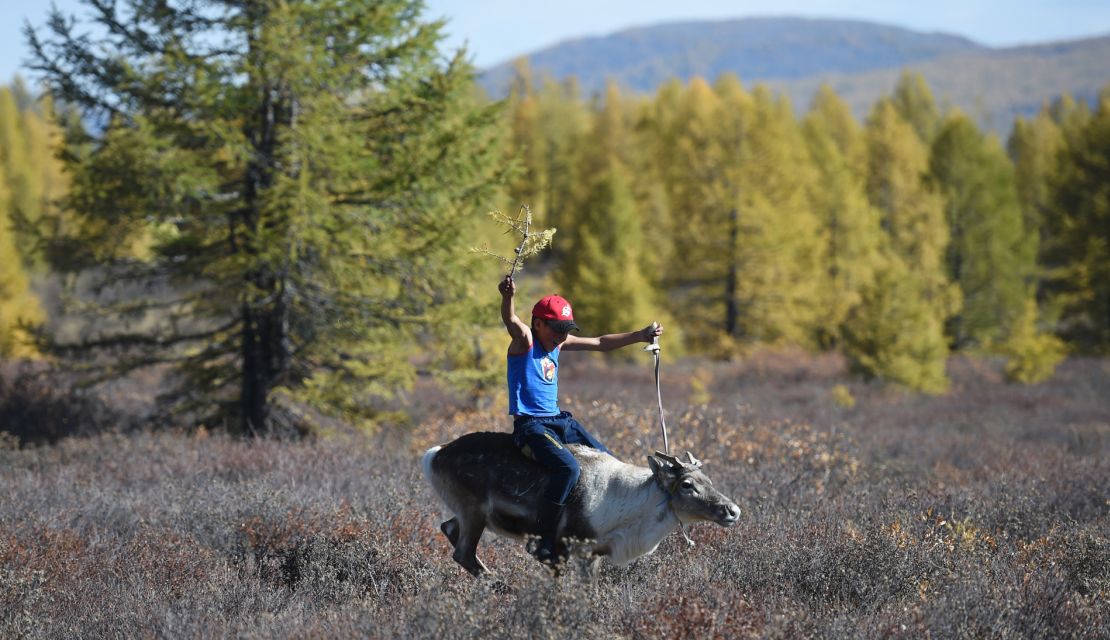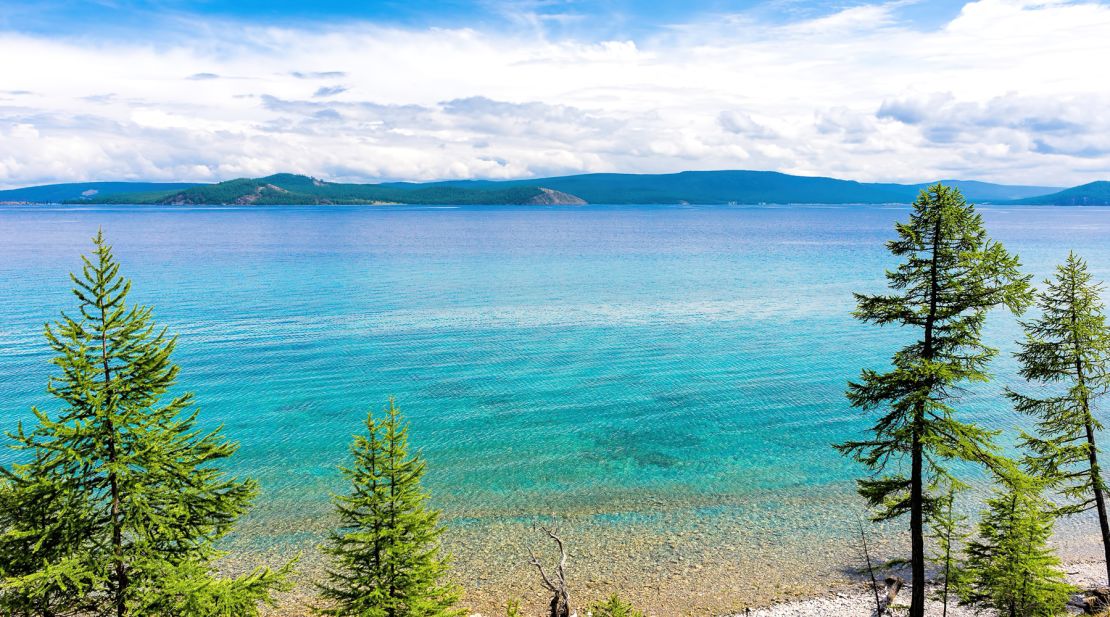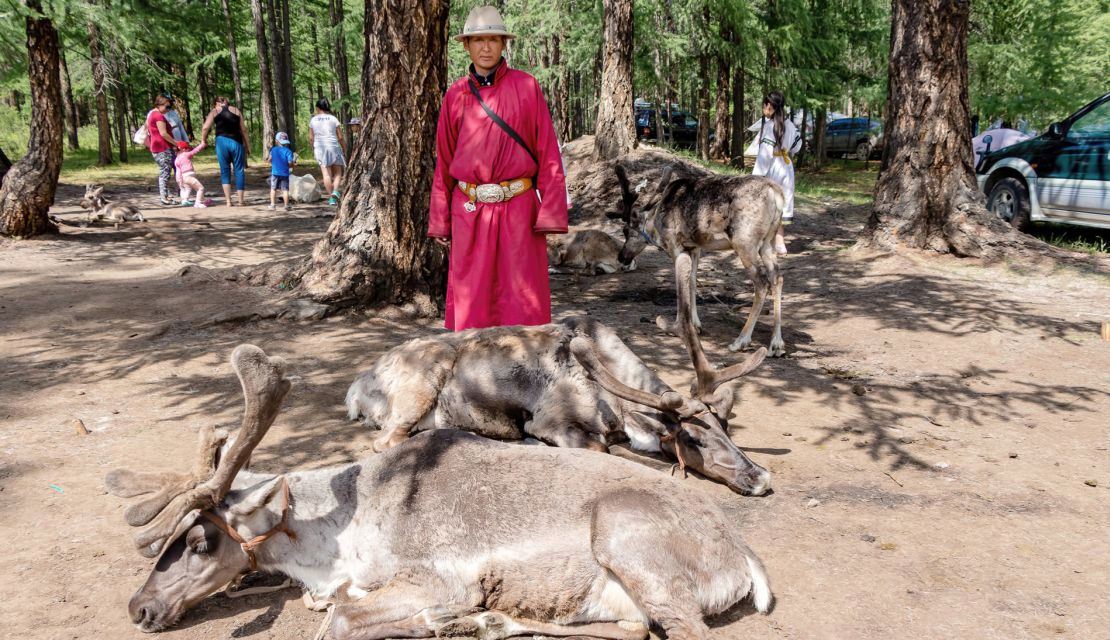Story highlights
The Dukha is one of the few remaining nomadic reindeer tribes in the world and the only one in Mongolia
The minority group faces difficulties in maintaining its culture and identity
A group of Dukhas migrate to the south in the summer to earn a living from tourists
Expert says it's a culture going extinct
For thousands of years, the Dukha people, also known as the Tsaatans, have lived in the remote, deep forest of northern Mongolia.
Moving from pasture to pasture every seven to 10 weeks, this tiny community of nomadic reindeer herders is one of the few remaining tribes of its kind.
Natives of Russian Siberia and Mongolia’s northernmost province of Khovsgol, Dukha herders depend on their reindeer for nearly all aspects of survival, as well as cultural and spiritual identity.
But as modern development makes its way into their remote habitat, their ancient traditions are now at risk of dying out.
MORE: 18 reasons to love Mongolia
A dying culture

“They’re certainly a dying culture,” says Harvard-trained anthropologist Hamid Sardar-Afkhami.
Sardar, who spent years living with the Dukha and documenting their way of life, believes there were once around 200 families living in this remote part of Mongolia.
Nowadays, he thinks there are probably only 40 families left with about 1,000 reindeer.
“The number of families has fallen because a lot of them have been synthesized with the mainstream community,” he says. “Many of them have moved to the towns and even to the capital cities.”
The biggest threat in Sardar-Afkhami’s view is the defection from the younger Dukha generation, who don’t want to live in the harsh conditions in the taiga (or “snow forest”).
“They want to go down and stay in warm cabins in the winter, maybe buy a car and drive,” he says.
“There’s a big appeal to the modern life. The hardships of the traditional life as a reindeer herder certainly play a factor.”
The rise of gold mining in the area, as well as the government’s move to restrict the Tsaatan’s hunting ground, has also hastened the decline.
“The government declared the Tsaatans’ hunting ground a part of the national protected parks. It’s now off-limits so they can’t hunt anymore,” he says.
As compensate, according to Sardar-Afkhami, each family was paid about $150.
“It’s a bit sad because these are traditional hunters and the reindeer need to move.
“When you pay them off like that, you’re destroying a part of their culture.”
To further add to the Dukhas’ woes, the number of the reindeer they’re so dependent on has dwindled dramatically due to diseases and lack of available treatment.
Surviving through tourism

All of these factors have forced some of the Dukha to rely on money from tourism to survive.
“Tourism’s a big source of income nowadays,” says Sardar-Afkhami. “They’re making considerable money off tourists.”
For some years now, travel companies have been regularly offering options to visit a Dukha community as part of a Mongolian itinerary.
But getting to their remote habitat requires advanced horse-riding skills, as well as days traveling on a bumpy road by car that many visitors aren’t prepared or equipped to undertake.
This has prompted a small group of reindeer herders to come down from their traditional area to set up camp near the popular Lake Khovsgol tourist areas.
Led by Enkhatuya, who is also the head shaman, a clan of about a dozen relatives offer tourists a glimpse of the Dukha lifestyle without having to travel deep into the larch forest.
Enkhatuya admits that life has been getting tougher for her people.
“This is the main reason we come down to Lake Khovsgol every summer,” she explains. “We need to earn enough money so that we can survive the winter.”
Controversy
The reindeer, in particular, have proved to be a big hit among visitors who happily pay 5,000 Mongolian Tugrik ($2.50) for a one-off photo opportunity.
Judging by the number of buses coming and going, the clan might easily make about $200 a day on average.
This is a lot of money by Mongolian standards, where the average worker earns an estimated $330 a month.
But their efforts have also attracted scrutiny from some travelers concerned about the reindeer being used to lure tourists.
So much so that some travel companies, such as Melbourne, Australia-based Intrepid Travel, now discourage visiting the tribe.

“Many travelers are of the opinion that this area isn’t the best environment for the reindeer as they’re native to much colder climates and are brought to Lake Khovsgol so the herders can benefit from tourism,” says Timur Yadamsuren, local guide and country manager for Intrepid Travel in Mongolia.
“For these reasons Intrepid Travel doesn’t recommend this activity.”
Enkhatuya dismisses the accusations and says, “As a culture we’ve deep connections with our reindeer. They’re like our family.”
“We would never abuse them as such. I can assure you they aren’t suffering.”
Despite their decreasing population, she believes Dukha culture will continue to flourish.
“Our young people are returning to continue our ancestral tradition,” she says. “They’re as close to the tribe and culture as they ever were. They’re continuing to speak our native language.”
In fact, Enkhatuya’s granddaughter has followed in her footsteps and become a shaman herself.
Even so, Sardar-Afkhami believes their ancient way of life is on the path to extinction.
“They’re the last of their kind,” says Sardar.
“Even if they survive, if they leave the reindeer herding culture that distinguishes them, their culture will die.”
Nila Sweeney is a Sydney-based writer and photographer. A former CNN producer, Sweeney has written on a range of topics including personal finance, lifestyle and current affairs.












